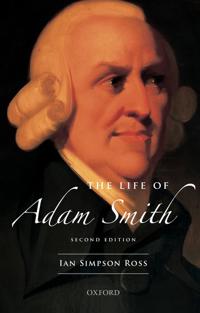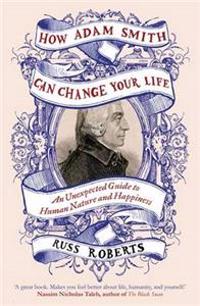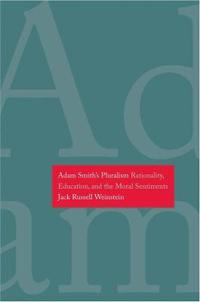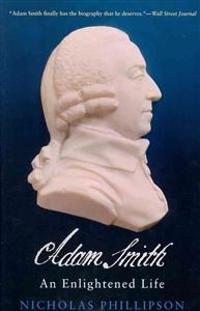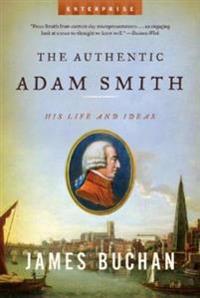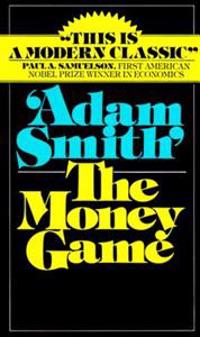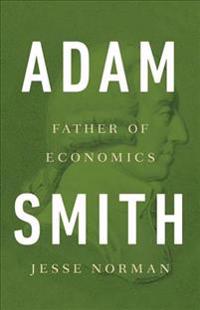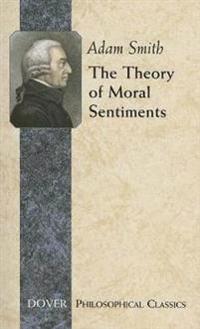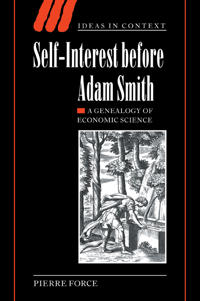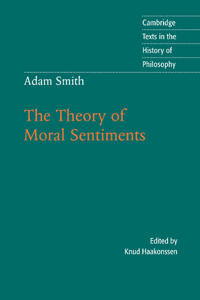Adam Smith Across Nations: Translations and Receptions of the "Wealth of Nations" (Inbunden)
avCheng-Chung Lai
ISBN: 9780198233398 - UTGIVEN: 2000-03-30The Oxford Handbook of Adam Smith
ISBN: 9780198753032 - UTGIVEN: 2016-06Adam Smith (1723-90) is a thinker with a distinctive perspective on human behaviour and social institutions. He is best known as the author of the An Inquiry into the Nature and Causes of the Wealth of Nations (1776). Yet his work is name-checked more often than it is read and then typically it is o[...]
Adam Smith: A Very Short Introduction (häftad)
ISBN: 9780198784456 - UTGIVEN: 2018-11In 1776 Adam Smith (1723-90) wrote The Wealth of Nations , a book so foundational it has led to him being called the 'father of economics'. Today he is associated with the promotion of self-interest, a defence of greed and a criticism of any governmental 'interference' in market transactions which, [...]
Contemporary Employment Relations (Pocket)
avStephen Williams, Derek Adam-smith
ISBN: 9780199545438 - UTGIVEN: 2009-10-29This accessible textbook offers a critical introduction to employment relations. It provides a thematic approach taking the subject beyond traditional coverage of trade unions and collective bargaining to tackle socio-political issues. The book is packed with up-to-date examples from Ryanair to Roya[...]
The Life of Adam Smith
ISBN: 9780199550036 - UTGIVEN: 2010-09This new edition of The Life of Adam Smith remains the only book to give a full account of Smith's life whilst also placing his work into the context of his life and times. Updated to include new scholarship which has recently come to light, this full-scale biography of Adam Smith examines the pers[...]
In the Shadow of Adam Smith (Pocket)
avDonald Rutherford
ISBN: 9780230252103 - UTGIVEN: 2012-08-21Using a large number of Scottish writers the themes of are all discussed. The distinctive Scottish contribution to the clash between natural liberty and socialist ideas is set out.[...]
Figure of Theater, The: Shaftesbury, Defoe, Adam Smith and George Eliot (Inbunden)
avDavid Marshall
ISBN: 9780231060844 - UTGIVEN: 1986-01-14How Adam Smith Can Change Your Life (Inbunden)
avRuss Roberts
ISBN: 9780241003190 - UTGIVEN: 2014-10A forgotten book by one of history's greatest thinkers reveals the surprising connections between happiness, virtue, fame, and fortune. "A great book. Makes you feel better about life, humanity, and yourself". (Nassim Nicholas Taleb, author of The Black Swan). Adam Smith became the patron saint of c[...]
How Adam Smith Can Change Your Life (häftad)
ISBN: 9780241003206 - UTGIVEN: 2015-08"A fun, fascinating, and original book that will challenge you to become a better version of yourself." (Daniel H. Pink, author of Drive). What does it take to be truly happy? Should we pursue fame and fortune or the respect of our friends and family? How can we make the world a better place? Two hu[...]
Adam Smith
ISBN: 9780241328491 - UTGIVEN: 2018-06Adam Smith is now widely regarded as 'the father of modern economics' and the most influential economist who ever lived. But what he really thought, and what the implications of his ideas are, remain fiercely contested. Was he an eloquent advocate of capitalism and the freedom of the individual? Or [...]
Adam Smith's Pluralism (Inbunden)
avJack Russell Weinstein
ISBN: 9780300162530 - UTGIVEN: 2013-10In this thought-provoking study, Jack Russell Weinstein suggests the foundations of liberalism can be found in the writings of Adam Smith (1723-1790), a pioneer of modern economic theory and a major figure in the Scottish Enlightenment. While offering an interpretive methodology for approaching Smit[...]
Adam Smith: An Enlightened Life (Häftad)
avNicholas Phillipson
ISBN: 9780300177671 - UTGIVEN: 201201Adam Smith (1723-90) is celebrated all over the world as the author of "The Wealth of Nations" and the founder of modern economics. A few of his ideas--that of the "invisible hand" of the market and that "It is not from the benevolence of the butcher, the brewer, or the baker that we expect our dinn[...]
Specimen Handling, Preparation, and Treatments in Surface Characterization (Inbunden)
avJason Marsh, Rodolfo Mendoza-Denton, Jeremy Adam Smith
ISBN: 9780306458873 - UTGIVEN: 1999-01This book is intended for professionals, researchers, technicians and students who are newcomers to the field as well as those with experience. It will be an important resource in the following fields: surface science, electronic materials and processes, thin film deposition, surface compositional a[...]
The American Civil War (Pocket)
avAdam I. P. Smith
ISBN: 9780333790540 - UTGIVEN: 2007-01-25This new interpretation of the causes, course and consequences of America's greatest crisis combines a clear and compelling narrative with analysis and an up-to-date assessment of the state of Civil War scholarship. It explores the complex relationships between the local and national contexts, betwe[...]
The Authentic Adam Smith
ISBN: 9780393329940 - UTGIVEN: 2007-08Adam Smith (1723-1790) has been adopted by neoconservatives as the ideological father of unregulated business and small government. His "invisible hand" has become a commanding shorthand for politicians promoting laissez-faire economics, but Smith never used it in reference to free-market capitalism[...]
The Money Game (Häftad)
avAdam Smith
ISBN: 9780394721033 - UTGIVEN: 1995-08Discusses the human factor in big business and offers behavioral studies of the professionals and amateurs of Wall Street[...]
Adam Smith: Father of Economics
ISBN: 9780465061976 - UTGIVEN: 2018-09A dazzlingly original account of the life and thought of Adam Smith, the greatest economist of all time Adam Smith (1723-1790) is now widely regarded as the greatest economist of all time. But what he really thought, and the implications of his ideas, remain fiercely contested. Was he an eloquent a[...]
Who's Afraid of Adam Smith?: How the Market Got Its Soul (Häftad)
avPeter J. Dougherty
ISBN: 9780471720904 - UTGIVEN: 2005-04-30The Theory of Moral Sentiments (Häftad)
avAdam Smith
ISBN: 9780486452913 - UTGIVEN: 200701The foundation for a system of morals, this 1749 work is a landmark of moral and political thought. Its highly original theories of conscience, moral judgment, and virtue offer a reconstruction of the Enlightenment concept of social science, embracing both political economy and theories of law and g[...]
Political Landscape, The: Constellations of Authority in Early Complex Polities (Övrig)
avAdam T. Smith
ISBN: 9780520237506 - UTGIVEN: 2003-09-26How do landscapes - defined in the broadest sense to incorporate the physical contours of the built environment, the aesthetics of form, and the imaginative reflections of spatial representations - contribute to the making of politics? Shifting through the archaeological, epigraphic, and artistic re[...]
Self-interest Before Adam Smith (Pocket)
avPierre Force
ISBN: 9780521036191 - UTGIVEN: 2007-04Self-Interest before Adam Smith inquires into the foundations of economic theory. It is generally assumed that the birth of modern economic science, marked by the publication of The Wealth of Nations in 1776, was the triumph of the 'selfish hypothesis' (the idea that self-interest is the motive of h[...]
Adam Smith's Politics (Häftad)
avDonald Winch
ISBN: 9780521292887 - UTGIVEN: 1978-05For most of the two hundred years or so that have passed since the publication of the Wealth of Nations, Adam Smith's writings on political and economic questions have been viewed within a liberal capitalist perspective of nineteenth- and twentieth- century provenance. This essay in interpretation s[...]
Adam Smith: The Theory of Moral Sentiments (Häftad)
ISBN: 9780521598477 - UTGIVEN: 2002-01Adam Smith?s Theory of Moral Sentiments (1759) lays the foundation for a general system of morals, and is a text of central importance in the history of moral and political thought. It presents a theory of the imagination which Smith derived from David Hume but which encompasses an idea of sympathy [...]





